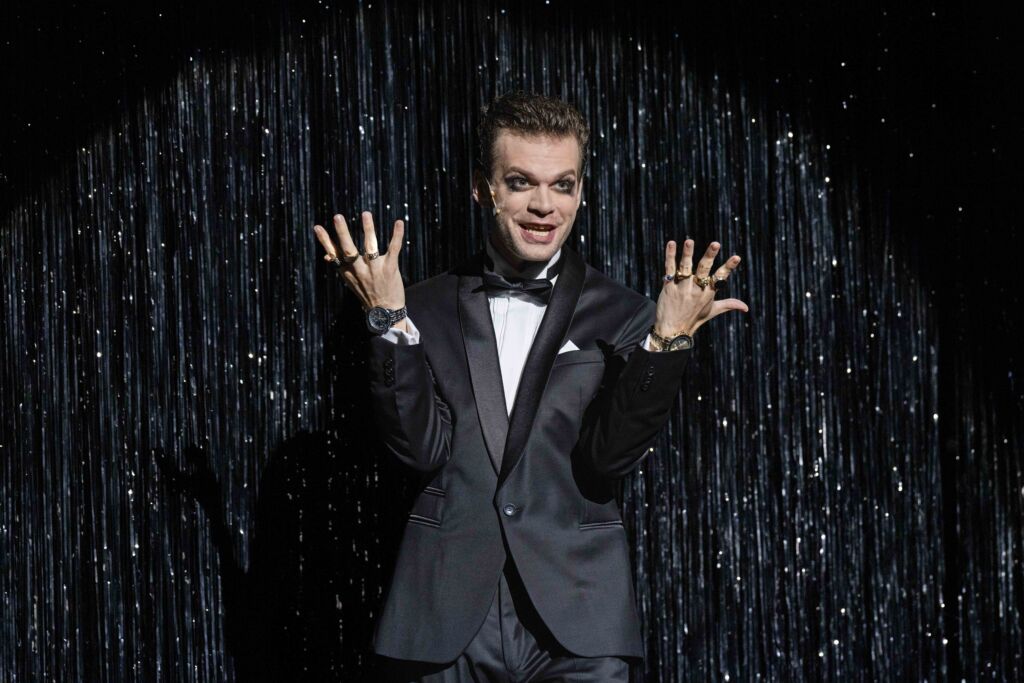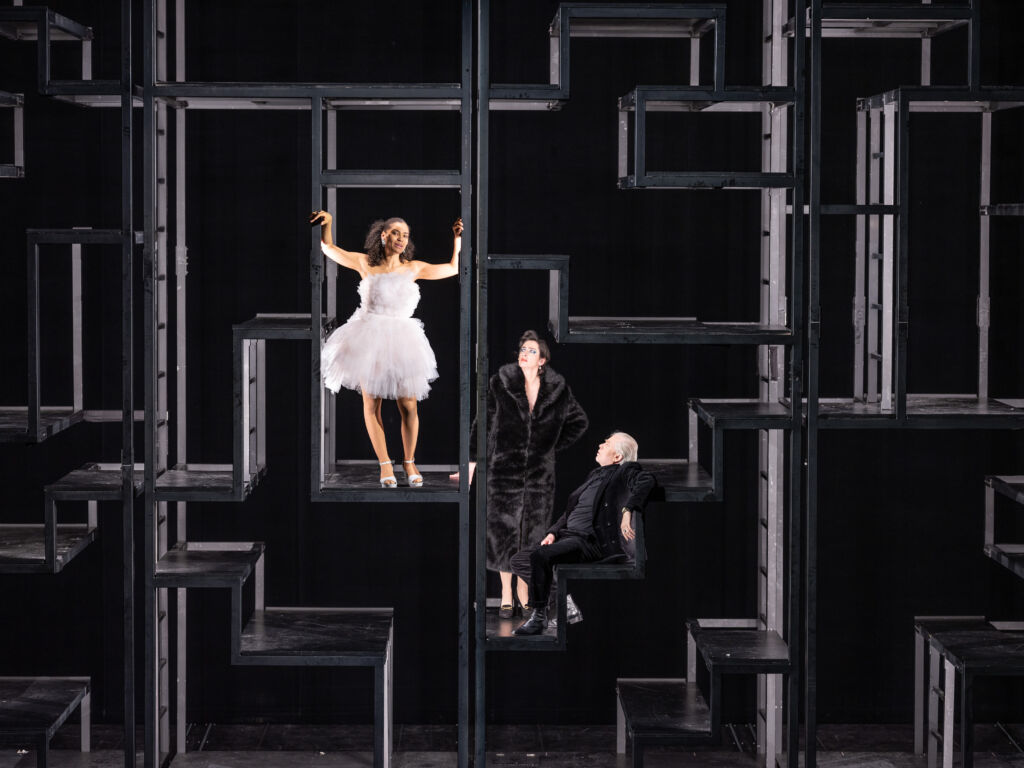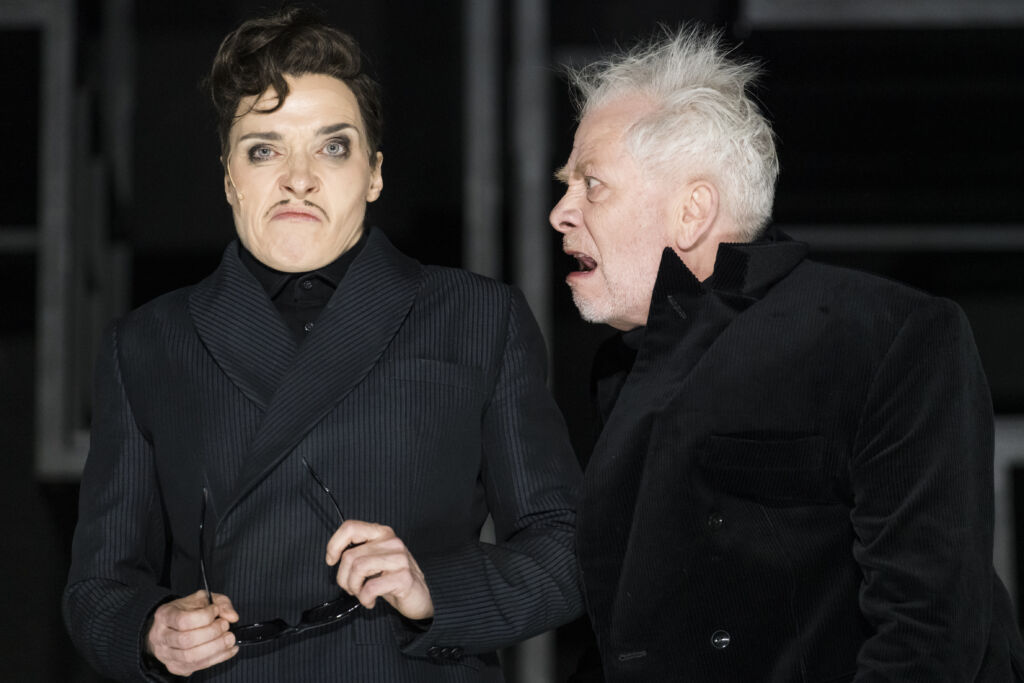Barrie Kosky never really liked The Threepenny Opera before he came to direct it. He told Limelight as much last year.
So, when it came to staging it for the Berliner Ensemble in 2021, he set about reworking it with the help of musical director Adam Benzwi.
In doing so they made cuts – lots of them – and challenged assumptions about Brechtian technique and how the piece, which Weill described as a “farce with music”, should be staged.
The result is a work of genius, giving The Threepenny Opera the contemporary treatment it so justly deserves.
In fact, after witnessing this performance at the Adelaide Festival, one wonders how it could ever have been staged differently.
It’s slick, it’s smooth and, like Gabriel Schneider’s Macheath (aka Mack the Knife), it’s sexy.

Gabriel Schneider in Berliner Ensemble’s Threepenny Opera directed by Barrie Kosky © Jörg Brüggemann
The portrayal of Macheath is key to Kosky’s unlocking of the piece, and Schneider delivers a breathtaking vocal and physically agile performance.
Gone is the clipped, cold ‘gentleman’ epitomised in Keith Warner’s dour Viennese production, or the Marlene Dietrich/Quentin Crisp hybrid in Robert Wilson’s acclaimed staging that preceded Kosky’s at the Berliner Ensemble.
Instead, Schnieder’s Macheath is a very real yet fantastic creation, at once perverse and seductive. Like the Phantom beneath the Paris Opera House, he kills before our eyes and remains irresistible.
Macheath begs us to love him, and we do, against our better judgement. We understand why Polly (Cynthia Micas), Lucy (Laura Balzer) and Jenny (Julia Berger) were all attracted to him because we are. And despite all his sins, we are overjoyed when his execution is revealed to be a sham.
It’s a superb take on the role and underpins a production in which Kosky and Benzwi prove it is possible to have your cake and eat it.
Yes, you can achieve the alienation effect while creating compelling characters; you can be appealing and appalling at the same time; and despite all its dissonance, the audience will still leave the theatre humming Weill’s music.
In true Vaudevillian style, Kosky has the cast address the audience directly. However, contrary to Brecht’s intentions, they don’t break character.
When Macheath asks an audience member to sing at his wedding to Polly (a routine that replaces Brecht’s original scene) it is at first funny. However, as his repeated demands become increasingly threatening, there is real fear in the air.
Polly saves the day, but when she turns back to the relieved audience member and tells him she just saved his life, we believe her. And that’s when you realise just how perfectly pitched Kosky’s direction and the ensemble’s performances are.

Cynthia Micas, Constanze Becker and Tilo Nest in Berliner Ensemble’s Threepenny Opera directed by Barrie Kosky © Jörg Brüggemann
From Macheath and the prostitutes to London’s chief of police, Jackie “Tiger” Brown, played here by Kathrin Wehlisch as a Chaplinesque drag king, the characters are all utterly convincing despite their artifice.
And let’s not forget Macheath’s conniving in-laws, with whom we spend much of the evening. In Kosky’s staging, they are just as memorable as Macheath.
Tilo Nest’s Loriot-style portrayal of Jonathan Peachum quickly turns into something far more menacing, while Constanze Becker approaches his wife Celia as a glamourous version of Vasilisa from Gorki’s Lower Depths, strutting around in her impressive fur coat and not much else.
With stagehands in full view and the fourth wall broken, the characters remain real, and this carries over into the delivery of their songs – a major departure from Brechtian technique and previous productions.
Brecht wanted the songs and the spoken text to occupy separate worlds, but Kosky and Benzwi have chosen not not to adhere to that.
Instead, the cast perform their musical numbers in character and in the context of the narrative, whether they are a dismembered head floating in the middle of a curtain of tinsel or scurrying around the rat maze-cum-cityscape designed by Rebecca Ringst.
Often bordering on Sprechgesang, their delivery is raw and steers clear of the operatic stylings that ruin so many other productions of The Threepenny Opera.
The women especially sound as if they have attended a masterclass with Lotte Lenya – music to this writer’s ears.

Kathrin Wehlisch and Tilo Nest in Berliner Ensemble’s Threepenny Opera directed by Barrie Kosky © Jörg Brüggemann
Benzwi leads a superb band of seven who, between them, play 15 instruments. He has shortened the musical transitions in which the musicians swap between them at lightning speed, and this keeps the performance punchy and tight.
The band is as much at home in the world of Jewish music as it is in the sounds of metropolitan Berlin or parodying Bach and Handel.
Kosky also relishes sending up operatic tropes. Anyone who saw his production of The Magic Flute at the Adelaide and Perth Festivals in 2019 will recall how he mercifully binned the dialogue and recitative.
Here he takes a different approach. Lucy’s secco recitative is wonderfully exaggerated, lampooning the worst excesses of Mozart and Rossini (or their collaborators, who more often than not wrote the stuff).
Kosky has previously referred to The Threepenny Opera as a “Bastardstück”, however in his staging it is anything but. Once a mixed bag thrown together by Brecht, Weill, Hauptmann and even Feuchtwanger, who gave the work its title, it has now acquired form and pace.
Four years shy of its centenary, The Threepenny Opera finally has a production that not only befits a masterpiece but qualifies it as such.
The Adelaide Festival presents the Berliner Ensemble’s production of The Threepenny Opera at Her Majesty’s Theatre in Adelaide until 10 March.











Comments
Log in to join the conversation.